
Walter Jakob Gehring was a Swiss developmental biologist who was a professor at the Biozentrum Basel of the University of Basel, Switzerland. He obtained his PhD at the University of Zurich in 1965 and after two years as a research assistant of Ernst Hadorn he joined Alan Garen's group at Yale University in New Haven as a postdoctoral fellow.

Neurexins (NRXN) are a family of presynaptic cell adhesion proteins that have roles in connecting neurons at the synapse. They are located mostly on the presynaptic membrane and contain a single transmembrane domain. The extracellular domain interacts with proteins in the synaptic cleft, most notably neuroligin, while the intracellular cytoplasmic portion interacts with proteins associated with exocytosis. Neurexin and neuroligin "shake hands," resulting in the connection between the two neurons and the production of a synapse. Neurexins mediate signaling across the synapse, and influence the properties of neural networks by synapse specificity. Neurexins were discovered as receptors for α-latrotoxin, a vertebrate-specific toxin in black widow spider venom that binds to presynaptic receptors and induces massive neurotransmitter release. In humans, alterations in genes encoding neurexins are implicated in autism and other cognitive diseases, such as Tourette syndrome and schizophrenia.

Gerald D. Fischbach is an American neuroscientist. He received his M.D. from the Weill Cornell Medical College of Cornell University in 1965 before beginning his research career at the National Institutes of Health in 1966, where his research focused on the mechanisms of neuromuscular junctions. After his tenure at the National Institutes of Health, Fischbach was a professor at Harvard University Medical School from 1972–1981 and 1990–1998 and the Washington University School of Medicine from 1981–1990. In 1998, he was named the director of the National Institute of Neurological Disorders and Stroke before becoming the Vice President and Dean of the Health and Biomedical Sciences, the Dean of the Faculty of Medicine, and the Dean of the Faculty of Health Sciences at Columbia University from 2001–2006. Gerald Fischbach currently serves as the scientific director overseeing the Simons Foundation Autism Research Initiative. Throughout Fischbach's career, much of his research has focused on the formation and function of the neuromuscular junction, which stemmed from his innovative use of cell culture to study synaptic mechanisms.
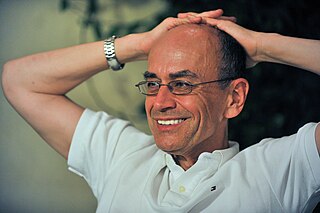
Thomas Christian Südhof, ForMemRS, is a German-American biochemist known for his study of synaptic transmission. Currently, he is a professor in the School of Medicine in the Department of Molecular and Cellular Physiology, and by courtesy in Neurology, and in Psychiatry and Behavioral Sciences at Stanford University.

The Biozentrum of the University of Basel specializes in basic molecular and biomedical research and teaching. Research includes the areas of cell growth and development, infection biology, neurobiology, structural biology and biophysics, and computational and systems biology. With more than 550 employees, the Biozentrum is the largest department at the University of Basel's Faculty of Science. It is home to 30 research groups with scientists from 45 nations.

Markus Affolter is a Swiss Developmental Biologist and Professor at the Biozentrum University of Basel, Switzerland.

Urs Jenal is a Swiss Microbiologist and Professor at the Biozentrum University of Basel, Switzerland.

Anne Spang is a German Biochemist/Cell Biologist and Professor at the Biozentrum University of Basel, Switzerland.

Silvia Arber is a Swiss neurobiologist. She teaches and researches at both the Biozentrum of the University of Basel and the Friedrich Miescher Institute for Biomedical Research in Basel Switzerland.
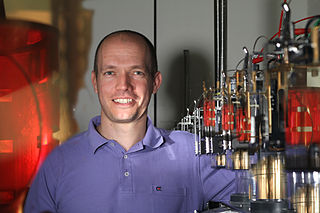
Christoph Handschin is a Swiss cell biologist at the Biozentrum University of Basel.

Michael Nip Hall is an American and Swiss molecular biologist and Professor at the Biozentrum University of Basel, Switzerland.

Tilman Schirmer is a structural biologist and Professor at the Biozentrum of the University of Basel.

Martin Spiess is a Swiss Biochemist and Professor at the Biozentrum University of Basel, Switzerland.
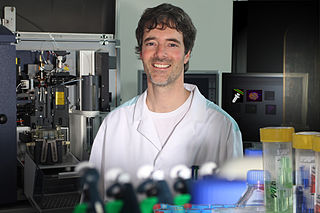
Dirk Bumann is a German infection biologist and professor at the Biozentrum of the University of Basel, Switzerland.
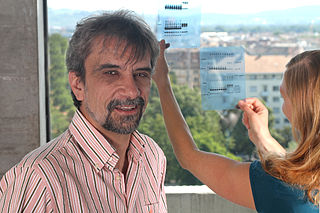
Markus Rüegg is a Swiss neurobiologist and professor at the Biozentrum of the University of Basel.
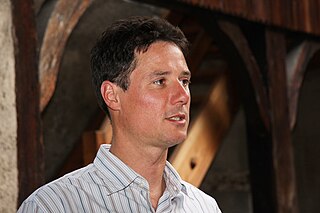
Jean Pieters is a Dutch biochemist and Professor at the Biozentrum of the University of Basel, Switzerland.

Urtė Neniškytė is a Lithuanian neuroscientist. Her scientific interest and main area of work relates to the interaction of neurons and immune cells in the brain. She has studied the cellular mechanisms of Alzheimer's disease and is the co-author of the first articles about cell death in relation to phagocytosis.
Joshua R Sanes is an American neurobiologist who is known for his contributions to the understanding of synapse development. Throughout his career, Sanes has been the recipient of various awards and honors, including membership to the U.S. National Academy of Sciences. His research involves an interdisciplinary approach which focuses mainly on the formation of synapses at the neuromuscular junction by combining the sciences of psychology, chemistry, biology, and engineering to study these circuits and employ molecular and genetic imaging to understand their function. Sanes currently lives in Boston, Massachusetts with his wife, Susan, and their two children.
Cagla Eroglu is a Turkish neuroscientist and Associate Professor of Cell Biology and Neurobiology at Duke University in Durham, North Carolina. Eroglu is also the Director of Graduate Studies in Cell and Molecular Biology at Duke University Medical Center. Eroglu is a leader in the field of glial biology and her lab focuses on exploring the role of glial cells, specifically astrocytes, in synaptic development and connectivity.
Lauren Orefice is an American neuroscientist and Assistant Professor in the Department of Molecular Biology at Massachusetts General Hospital and in the Department of Genetics at Harvard Medical School. Orefice has made innovative discoveries about the role of peripheral nerves and sensory hypersensitivity in the development of Autism-like behaviors. Her research now focuses on exploring the basic biology of somatosensory neural circuits for both touch and gastrointestinal function in order to shed light on how peripheral sensation impacts brain development and susceptibility to diseases like Autism Spectrum Disorders.

















